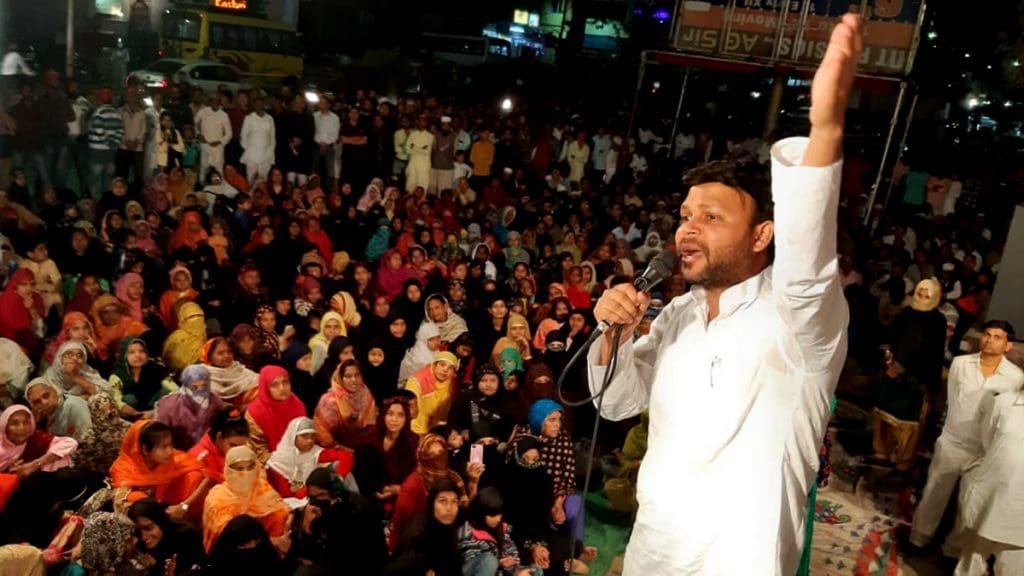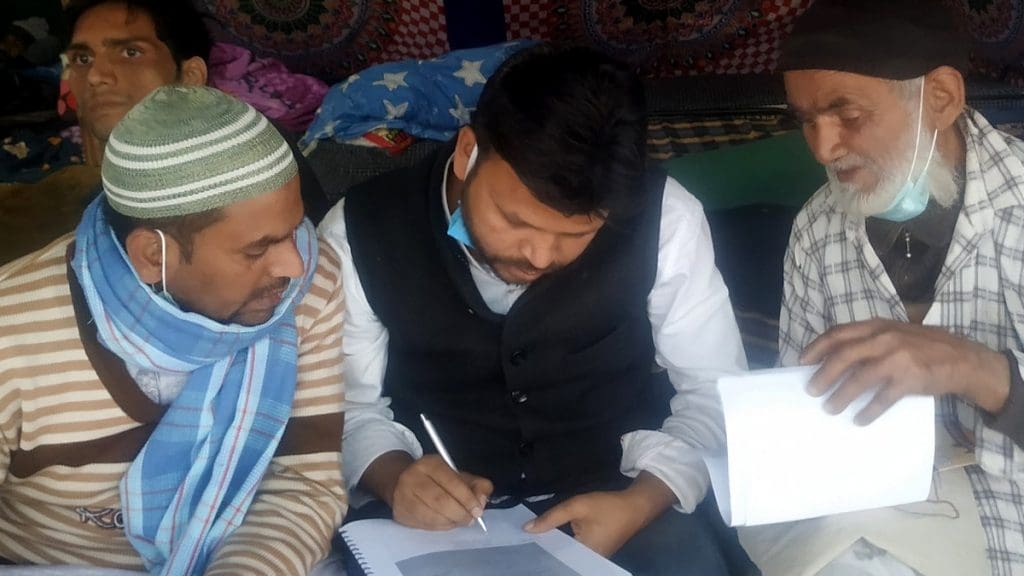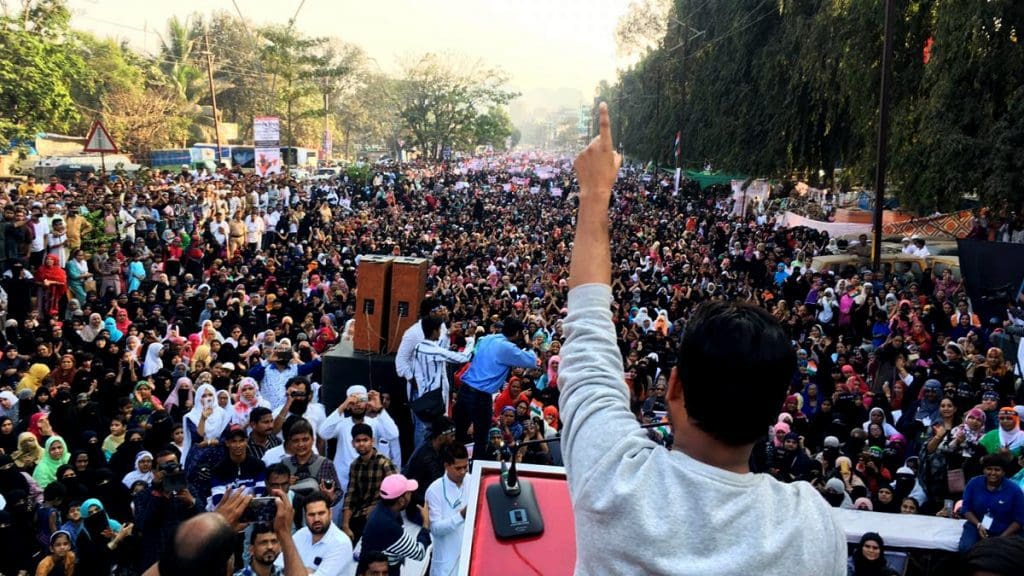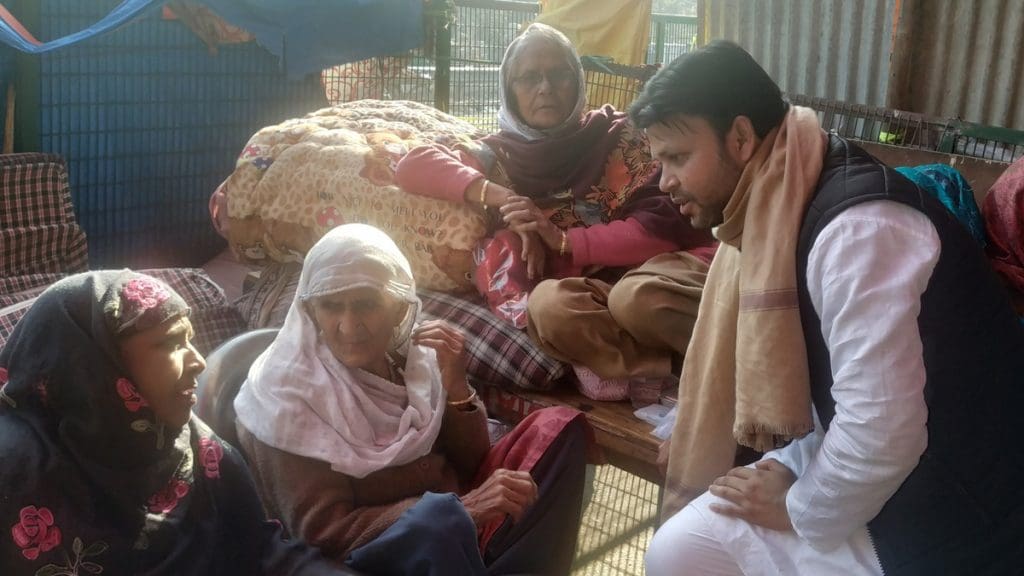
On 13 December 2019, Delhi Police unleashed brute violence against students of Jamia Millia Islamia University for protesting against India’s anti-Muslim citizenship law. Meeran Haider was absent when tear gas shells exploded on the campus. He was back in his hometown in Bihar, mourning his deceased mother.
“He called and I told him about the situation,” Haider’s friend told Maktoob. ”He reached the university the very next day”. When, in the coming hours, Jamia lived through the night of horror to become the epicentre of the anti-Citizenship Amendment Act (CAA) movement against Prime Minister Narendra Modi’s genocidal policies, Haider was at the forefront of the resistance.
Haider is one of the student leaders and activists spending time in judicial custody without bail for over a year in the Delhi pogrom conspiracy case. He is charged with India’s stringent terror law Unlawful Activities Prevention Act (UAPA) for funding and conspiring to orchestrate the Delhi pogrom.
The Investigation is called out by the rights group as a guise to stifle the dissenting voices against India’s Hindu nationalist regime. The 18000-page primary charge-sheet filed by Delhi police names dozens of activists implicating the anti-CAA movement as a cover to create unrest in the country.
The 30-year-old was arrested on 01 April last year, a week into nationwide lockdown due to the coronavirus outbreak. Haider, president of Rashtriya Janata Dal youth wing in Delhi, was engaged in relief work for the stranded migrant workers in the national capital when he was arrested.
“I will return by evening” – Meeran told his worried friend. “He felt no foul play at that moment. There was no way they could fabricate suspicions from nothing, but they did.”
Haider was booked under sections of the Indian Penal Code (IPC) including 124 A (sedition), 302 (murder), 307 (attempt to murder), 153 A (promoting enmity between different groups on grounds of religion, etc.) and 120 B criminal conspiracy), etc.
When the primary chargesheet came out in September 2020, Meeran Haider wrote a letter from Tihar jail describing his innocence and torture during his custody.
“In custody, I was forced to sign around 35-40 blank papers and 4-5 printed files. On refusing to sign on the same, I was tortured and left with no option,” Reads the letter.
Recovering from torture and uncertainty in the early months in jail, Haider claims he dares to withstand the trial and fight the ‘malicious’ charges against him.
Meeran’s leadership in Jamia
Born to a farmer and a housewife in Siwan, west of Bihar, Haider moved to Jamia Nagar in 2005 to study in senior secondary school, part of Jamia university campus. “He was close to family. He would help his nephews with lessons during vacation,” recalls Shama Parveen, Meeran’s sister.
Batla House encounter in 2008, brought the spotlight to Jamia, in which two students of the University were shot dead by police. The incident triggered creating a renewed political awakening in Muslim youth from Jamia, including Haider. Political ambitions sprouted in Haider as we joined Jamia Millia Islamia for engineering the same year.
“He had aspirations to become political,” says his close friend. “ He would join all protests happening in Delhi with enthusiasm”. Haider remains to be a student of Jamia doing his PhD in Management studies after completing graduation in Mechanical Engineering, MBA in International Business and M-Phil degree in West Asian Studies.


In 2017, Haider, along with other political activists formed Jamia Students Forum (JSF). An articulate orator, he became the voice of Jamia in key protests. He has served as the president of JSF before joining mainstream political parties.
The students union has been banned in Jamia Millia Islamia since 2006 citing aggressive politics and violence. “It was important to have a students union to claim students’ rights which are undermined by authorities”.
The same year Haider observed a hunger strike for seven days to restore the students union in Jamia.
“He did not just choose to speak up for right, he dedicated his most crucial years of life to serve for people,” says another friend. “He was fully invested. I remember asking him in our initial meetings about giving up all the time for activism. He said —” if we don’t speak now then our future generations would suffer. Eventually, someone has to speak up” — and the irony is that today also when I speak to him he tells me the same thing”.
“When Meeran launched his political career in 2013, the family didn’t appreciate it,” says Parveen. The family was under the impression Indian politics is no good for Muslim youth. “Later we supported him”.
Haider joined Aam Aadmi Party’s youth wing, Chatra Yuva Sangharsh Samiti (CYSS) and became a leading figure in the party. “We thought revolution was coming,” says his friend who introduced him to AAP. “It was like an apolitical political party. More like social work. We were drawn into it”.
But soon AAP undermined the role of Muslims in the party. “They didn’t entertain learned Muslims. They overlooked Meeran’s aspirations to fight elections”. Haider left Aam Aadmi to join RJD.


Haider is part of many civil rights groups in Delhi working for human rights, violated by Modi’s Hindutva regime. He worked alongside Khalid Saifi, Umar Khalid and Asif Iqbal Tanha in the campaign to investigate the ‘forced disappearance’ of Najeeb Ahmed, from the Jawaharlal Nehru University campus.
Jamia protest the anti-Muslim citizenship law
The week Haider’s mother passed away, India passed a new amendment of citizenship law that discriminates against Muslims. Jamia students protest saw violent crackdown from Delhi police but students turned back on streets in coming days.
On December 15 2019, Police entered the campus at night breaking into libraries, hostels and using brute force on unarmed students including women.
“When I called him, he was crying and unsettling”, his sister remembers. Many students were severely injured and shaken by the police action. But student leaders swung into action and formed a collective called Jamia Coordination Committee to steer the leaderless movement.
“Meeran was a veteran among us. He knew how to manage a crisis,” says Ramees EK, a researcher at Jamia who was part of JCC. The group coordinated a 100 day-long sit-in protest infront of the campus, inspiring replication across India. Meeran travelled to protest in parts of India and campaigned to peacefully protest Modi’s genocidal policies.
“He kept aside his comfort and personal pain,” says his friend. “Meeran was detained during the protests and sustained injuries several times”.
The protest flourished despite crackdowns across India taking over 80 lives. In Delhi, atleast 53 people were killed in the last week of February 2020.
“We were morally down but not ready to give up,” one of Meeran’s friend investigated in FIR 59 told Maktoob. Protesters only left in the wake of the Covid pandemic, before government-imposed lockdown.
“People were adamant not to leave the protest site. Meeran gave a powerful speech. He spoke about our social responsibility and they listened to him,” recall Ramees EK. On the first day of lockdown, the protest sites were forcefully removed by Delhi police, vandalising installations and whitewashing graffiti.
Arrest and a year in jail
FIR 59/20 which looked into the premeditated conspiracy that triggered Delhi carnage was registered on March 6, based on the information provided by Arvind Kumar of the Crime Branch. The investigation primarily targeted the Popular Front of India but eventually moved to other groups which were helping anti-CAA protests in Delhi.


By April, UAPA was added to the charges and a ‘larger conspiracy’ was unearthed, according to police. Khalid Saifi, Ishrat Jahan and Tahir Hussain were named and activists in Delhi were served notice for interrogation.
“Nobody expected Meeran to be arrested. Everyone was puzzled. But when Safoora was arrested, we knew it was raining on us,” says Ramees EK. After Meeran, Safoora Zargar, Jamia student media coordinator of JCC, Shifa ul Rahman – president of Jamia Alumni group, and another student leader of Jamia, Asif Tanha, was arrested in the same FIR.
Dozens of students from Jamia were interrogated in the coming months which has not come to an end.
Arrested during an unprecedented situation, it took three months for the family members to hear his voice. Visits and Telephone calls were banned due to the pandemic. “I had only one pair of clothes for four months and I won’t sleep at night,” Haider wrote in his letter.
Although RJD leaders campaigned for Haidar’s release in the initial weeks, “they moved on” according to his friends. “They never used his name during the last [state] election,” they complain.
In the letter, Haider refutes the accusations made by Delhi Police in the chargesheet. Meeran who is accused of financing for violence claimed that he had used the crowdfund money for relief of victims from the same violence. “Pictures and details [of the relief work] are on the phone that is seized by the special cell [police]”.
According to Meeran, he was attending his research classes when he heard about the stirring violence. “In the Chargesheet, it is written that on 24th February 2020, Umar Khalid had called me up and told me to gherao [block] Police headquarter which is a sheer lie”.
“That evening I had put a message on JCC for gherao of Delhi Police Headquarter. When the news of gherao spread, I received calls from Jamia SHO, ACP Ganesh Ji, and DCP RP Meena Sahab saying to not do gherao, and it will lead to a law and order problem”.
Haider understanding the hostility and warnings from police, tried to cancel the call but it went in vain. Fearing confrontation, he negotiated with police to accept the memorandum and guaranteed to disperse the demonstration. “ Umar Khalid called me to tell me there will be lathi-charge,” claims Haider. This conversation is deemed as a plan to block police headquarters — according to the chargesheet.
He also rubbishes the police narration that he was managing several protest sites in Delhi. “I have hardly been to any of them,” Haider claims. The trial in the case is yet to start even after a year has passed into the investigation.
“ I gave nothing but sadness to my family,” laments Haider in his letter. ”I ran in campus, Janter Manter, doing gherao, demonstration, or something for the community or party”.
“For UAPA, I have patience. I know it will take a bit of time to come out”. Haider concludes his letter.
Names of Meeran Haider’s friends are withheld due to security reasons.



